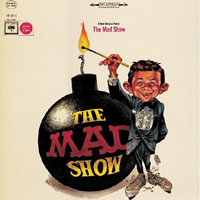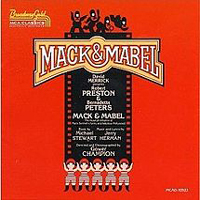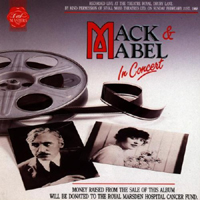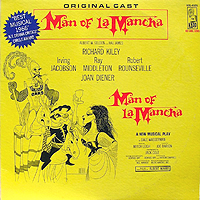 Original Broadway Cast, 1965 (Kapp/Decca)
Original Broadway Cast, 1965 (Kapp/Decca)  (5 / 5) This first recording of the Mitch Leigh-Joe Darion score for their musical inspired by Miguel de Cervantes’ epic novel Don Quixote is definitive. Richard Kiley is so vocally and dramatically brilliant as Cervantes/Quixote that he set the bar almost impossibly high for all future interpreters of the role. His fully committed, richly sung performance of the score’s signature item, “The Impossible Dream” — one of the last Broadway songs to become a pop hit in the 1960s — is all that anyone could ask for. Playing opposite him as Aldonza, Joan Diener gives an amazing vocal performance. She was one of those rare singing actresses who boasted a strong chest voice with a full soprano extension, and when Diener ends her powerfully belted performance of “It’s All the Same” with a flight into the soprano stratosphere, or when she switches back and forth between registers in “Aldonza,” the effect is breathtaking. Completing the musical’s central triumvirate, Irving Jacobson’s Sancho Panza is warm, funny, and endearing. Among the excellent supporting cast, the golden-voiced Robert Rounseville and Ray Middleton are the Padre and the Innkeeper, respectively. Harry Theyard, as a muleteer, offers two starkly contrasting performances of “Little Bird” — one gorgeously lyrical, the other frighteningly violent. Even though the flamenco rhythms employed by Leigh are inappropriate to the period, and some of Darion’s lyrics are ungrammatical, there is much to love about this score. If there’s anything to regret in the CD transfer of the recording, it’s that the “I, Don Quixote” number eliminates the terrifying Inquisition theme that begins this track on the LP. On the plus side, the technical quality of the digital remastering is superb. — Michael Portantiere
(5 / 5) This first recording of the Mitch Leigh-Joe Darion score for their musical inspired by Miguel de Cervantes’ epic novel Don Quixote is definitive. Richard Kiley is so vocally and dramatically brilliant as Cervantes/Quixote that he set the bar almost impossibly high for all future interpreters of the role. His fully committed, richly sung performance of the score’s signature item, “The Impossible Dream” — one of the last Broadway songs to become a pop hit in the 1960s — is all that anyone could ask for. Playing opposite him as Aldonza, Joan Diener gives an amazing vocal performance. She was one of those rare singing actresses who boasted a strong chest voice with a full soprano extension, and when Diener ends her powerfully belted performance of “It’s All the Same” with a flight into the soprano stratosphere, or when she switches back and forth between registers in “Aldonza,” the effect is breathtaking. Completing the musical’s central triumvirate, Irving Jacobson’s Sancho Panza is warm, funny, and endearing. Among the excellent supporting cast, the golden-voiced Robert Rounseville and Ray Middleton are the Padre and the Innkeeper, respectively. Harry Theyard, as a muleteer, offers two starkly contrasting performances of “Little Bird” — one gorgeously lyrical, the other frighteningly violent. Even though the flamenco rhythms employed by Leigh are inappropriate to the period, and some of Darion’s lyrics are ungrammatical, there is much to love about this score. If there’s anything to regret in the CD transfer of the recording, it’s that the “I, Don Quixote” number eliminates the terrifying Inquisition theme that begins this track on the LP. On the plus side, the technical quality of the digital remastering is superb. — Michael Portantiere
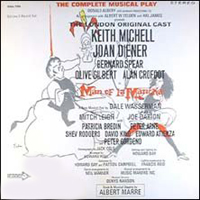 Original London Cast, 1968 (Decca, 2LPs/no CD)
Original London Cast, 1968 (Decca, 2LPs/no CD)  (3 / 5) While this is not really a “complete” Man of La Mancha, the two-LP set does give us a vivid sense of the show through its inclusion of the bulk of the script (by Dale Wasserman) and some well produced sound effects. Keith Michell is almost as magnificent a Cervantes/Quixote as the role’s creator, Richard Kiley, both dramatically and musically speaking. Joan Diener is back as Aldonza, but most unfortunately, her performance here is extremely over-acted and lacking in spontaneity; it sounds as if she had given up on playing the character, having decided instead to deliver a star turn. Despite this major caveat, the London Man of La Mancha deserves a CD release. With the glaring exception of Patricia Bredin as Antonia, who back-phrases most annoyingly in “I’m Only Thinking of Him,” the supporting cast is fine, especially Alan Crofoot as the Padre. The sound quality of the recording is excellent, and another plus is that we get to hear that chilling Inquisition theme more than once. — M.P.
(3 / 5) While this is not really a “complete” Man of La Mancha, the two-LP set does give us a vivid sense of the show through its inclusion of the bulk of the script (by Dale Wasserman) and some well produced sound effects. Keith Michell is almost as magnificent a Cervantes/Quixote as the role’s creator, Richard Kiley, both dramatically and musically speaking. Joan Diener is back as Aldonza, but most unfortunately, her performance here is extremely over-acted and lacking in spontaneity; it sounds as if she had given up on playing the character, having decided instead to deliver a star turn. Despite this major caveat, the London Man of La Mancha deserves a CD release. With the glaring exception of Patricia Bredin as Antonia, who back-phrases most annoyingly in “I’m Only Thinking of Him,” the supporting cast is fine, especially Alan Crofoot as the Padre. The sound quality of the recording is excellent, and another plus is that we get to hear that chilling Inquisition theme more than once. — M.P.
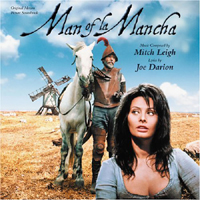 Film Soundtrack, 1972 (United Artists/Varese Sarabande) No stars; not recommended. What a disaster this is. On paper, Peter O’Toole and Sophia Loren would seem excellent casting for a film version of Man of La Mancha, providing that their singing voices were skillfully dubbed by others. Alas! Simon Gilbert, who ghosts for O’Toole, has a good-enough voice but very strange mannerisms of enunciation; just listen to him sing the lyric “thou art base and debauched as can be,” hitting every “b” with a sledgehammer. As for Loren, she was unwisely allowed to do her own singing here, and the results are borderline embarrassing. Her poorly supported, unpleasant sounding voice has about one-third the range required for Aldonza’s music, and her weirdly modified Italian accent is a further liability. Up against these two, James Coco manages to retain his dignity as Sancho, although he sings his part in “I, Don Quixote” down the octave from where it’s written in the score for the stage version. Ian Richardson has far too thin a voice for the Padre, so for that reason, it’s just as well that the beautiful song “To Each His Dulcinea” was cut from the film. The one good thing about this recording is that the orchestrations for symphony-sized forces were done skillfully; it’s nice to hear strings in this score, even if the original orchestrations for a much smaller complement of musicians remain superior overall. — M.P.
Film Soundtrack, 1972 (United Artists/Varese Sarabande) No stars; not recommended. What a disaster this is. On paper, Peter O’Toole and Sophia Loren would seem excellent casting for a film version of Man of La Mancha, providing that their singing voices were skillfully dubbed by others. Alas! Simon Gilbert, who ghosts for O’Toole, has a good-enough voice but very strange mannerisms of enunciation; just listen to him sing the lyric “thou art base and debauched as can be,” hitting every “b” with a sledgehammer. As for Loren, she was unwisely allowed to do her own singing here, and the results are borderline embarrassing. Her poorly supported, unpleasant sounding voice has about one-third the range required for Aldonza’s music, and her weirdly modified Italian accent is a further liability. Up against these two, James Coco manages to retain his dignity as Sancho, although he sings his part in “I, Don Quixote” down the octave from where it’s written in the score for the stage version. Ian Richardson has far too thin a voice for the Padre, so for that reason, it’s just as well that the beautiful song “To Each His Dulcinea” was cut from the film. The one good thing about this recording is that the orchestrations for symphony-sized forces were done skillfully; it’s nice to hear strings in this score, even if the original orchestrations for a much smaller complement of musicians remain superior overall. — M.P.
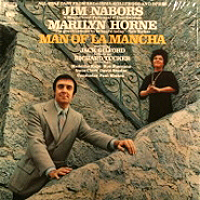 Studio Cast, 1972 (Columbia/no CD)
Studio Cast, 1972 (Columbia/no CD)  (2 / 5) This recording was only briefly in print, and it’s hard to find nowadays. Jim Nabors, famous as the star of the 1960s TV sitcom Gomer Pyle, USMC, possessed a legit baritone voice that gave him some additional career mileage, but his sound here is affected and unnaturally covered to the point of camp — certainly not the impression that a good Cervantes/Don Quixote is supposed to make. Singing the role of Aldonza is superstar opera diva Marilyn Horne in a frustrating performance; her magnificent mezzo is right for the role, but she sings “It’s All the Same” and other songs so squarely and with such low energy that they make little impression. That’s surprising, as Horne was famed as an excellent singing actress in opera, and she did very well with musical theater material on other occasions. (Perhaps she was under-rehearsed for this endeavor.) By far the best of the three principals is Jack Gilford, a wonderfully endearing Sancho. The supporting cast — Madeline Kahn as Antonia, Ron Hussman as the Innkeeper, and the great opera tenor Richard Tucker as the Padre — is uniformly excellent, and the original orchestrations are wisely used, but the unsatisfying performances of Horne and especially Nabors make this album little more than a curiosity. — M.P.
(2 / 5) This recording was only briefly in print, and it’s hard to find nowadays. Jim Nabors, famous as the star of the 1960s TV sitcom Gomer Pyle, USMC, possessed a legit baritone voice that gave him some additional career mileage, but his sound here is affected and unnaturally covered to the point of camp — certainly not the impression that a good Cervantes/Don Quixote is supposed to make. Singing the role of Aldonza is superstar opera diva Marilyn Horne in a frustrating performance; her magnificent mezzo is right for the role, but she sings “It’s All the Same” and other songs so squarely and with such low energy that they make little impression. That’s surprising, as Horne was famed as an excellent singing actress in opera, and she did very well with musical theater material on other occasions. (Perhaps she was under-rehearsed for this endeavor.) By far the best of the three principals is Jack Gilford, a wonderfully endearing Sancho. The supporting cast — Madeline Kahn as Antonia, Ron Hussman as the Innkeeper, and the great opera tenor Richard Tucker as the Padre — is uniformly excellent, and the original orchestrations are wisely used, but the unsatisfying performances of Horne and especially Nabors make this album little more than a curiosity. — M.P.
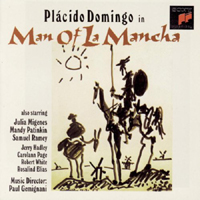 Studio Cast, 1990 (Sony)
Studio Cast, 1990 (Sony)  (2 / 5) There’s nothing terribly wrong about this recording aside from the presence of the outrageously mannered Mandy Patinkin as Sancho Panza. But, somehow, the whole thing doesn’t jell, even though the original orchestrations are expertly conducted here by Paul Gemignani. Opera icon Placido Domingo sings Quixote’s songs with all of the glorious tone you’d expect, but his Spanish accent is distracting — even though he is playing a Spanish character. (This is, after all, an American musical.) Julia Migenes is well cast and has many fine moments as Aldonza, but her performance isn’t as mercurial as Joan Diener’s on the original Broadway recording, and she doesn’t use her chest register in the same full-out way that Diener did. Jerry Hadley’s tenor sounds lovely in the Padre’s songs, but though Samuel Ramey possessed one of the richest, fullest, and darkest bass voices in operatic history, it’s not a voice that’s appropriate to the Innkeeper — or, really, to any other musical theater role. This isn’t the worst recording of Man of La Mancha, but it’s very far from the best. — M.P.
(2 / 5) There’s nothing terribly wrong about this recording aside from the presence of the outrageously mannered Mandy Patinkin as Sancho Panza. But, somehow, the whole thing doesn’t jell, even though the original orchestrations are expertly conducted here by Paul Gemignani. Opera icon Placido Domingo sings Quixote’s songs with all of the glorious tone you’d expect, but his Spanish accent is distracting — even though he is playing a Spanish character. (This is, after all, an American musical.) Julia Migenes is well cast and has many fine moments as Aldonza, but her performance isn’t as mercurial as Joan Diener’s on the original Broadway recording, and she doesn’t use her chest register in the same full-out way that Diener did. Jerry Hadley’s tenor sounds lovely in the Padre’s songs, but though Samuel Ramey possessed one of the richest, fullest, and darkest bass voices in operatic history, it’s not a voice that’s appropriate to the Innkeeper — or, really, to any other musical theater role. This isn’t the worst recording of Man of La Mancha, but it’s very far from the best. — M.P.
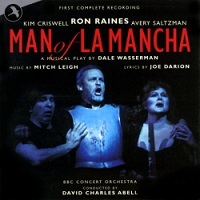 Covent Garden Music Festival Cast, 2000 (JAY, 2CDs)
Covent Garden Music Festival Cast, 2000 (JAY, 2CDs)  (2 / 5) Here’s a truly complete audio recording of Man of La Mancha –– the entire score, all of the dialogue, the whole nine yards. In the title role, Ron Raines is close to ideal from a vocal standpoint. His big, warm, powerful baritone is “legit” without sounding too heavily operatic, and his acting of the dialogue is strong, if not at the level of Keith Michell on the 1968 album. Less happily cast is Kim Criswell as Aldonza; her voice sounds wrong for the character in terms of type (not earthy enough), and she does quite a lot of shouting and growling in the lower-lying, more dramatic portions of the score. Her best performance is that of Aldonza’s most lyrical song, “What Does He Want of Me?” Avery Saltzman is an enjoyable Sancho in a sort of neo-vaudeville/Borscht Belt/American TV comedian style. In other roles, Hilton Marlton is a very British-sounding Padre who sings “To Each His Dulcinea” beautifully, and it’s nice to hear George Dvorsky in the two contrasting versions of “Little Bird.” The BBC Concert Orchestra plays excitingly under Charles Abel, aside from one or two odd tempo choices (e.g, some of the music for “The Abduction”), and the whole performance has a wonderful theatricality to it. Like the other complete recordings of musicals from JAY Records, this one would be commendable for that reason alone, over and above its other virtues. — M.P.
(2 / 5) Here’s a truly complete audio recording of Man of La Mancha –– the entire score, all of the dialogue, the whole nine yards. In the title role, Ron Raines is close to ideal from a vocal standpoint. His big, warm, powerful baritone is “legit” without sounding too heavily operatic, and his acting of the dialogue is strong, if not at the level of Keith Michell on the 1968 album. Less happily cast is Kim Criswell as Aldonza; her voice sounds wrong for the character in terms of type (not earthy enough), and she does quite a lot of shouting and growling in the lower-lying, more dramatic portions of the score. Her best performance is that of Aldonza’s most lyrical song, “What Does He Want of Me?” Avery Saltzman is an enjoyable Sancho in a sort of neo-vaudeville/Borscht Belt/American TV comedian style. In other roles, Hilton Marlton is a very British-sounding Padre who sings “To Each His Dulcinea” beautifully, and it’s nice to hear George Dvorsky in the two contrasting versions of “Little Bird.” The BBC Concert Orchestra plays excitingly under Charles Abel, aside from one or two odd tempo choices (e.g, some of the music for “The Abduction”), and the whole performance has a wonderful theatricality to it. Like the other complete recordings of musicals from JAY Records, this one would be commendable for that reason alone, over and above its other virtues. — M.P.
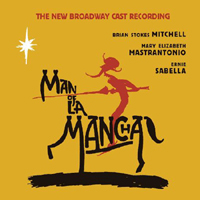 Broadway Cast, 2002 (RCA)
Broadway Cast, 2002 (RCA)  (1 / 5) Brian Stokes Mitchell’s performance as Coalhouse Walker in Ragtime was a musical theater triumph, but even judging solely on the basis of this recording, the role of Cervantes/Don Quixote in Man of La Mancha is not in his wheelhouse. While Mitchell possesses an impressive baritone, his singing style is ill-suited to this assignment; he slides off of some notes like a pop/jazz vocalist, and his grandstanding rendition of a pointlessly extended version of “The Impossible Dream” is off-putting. Equally disconcerting is his delivery of the dialogue that’s included here. When playing Cervantes, Mitchell sounds like a genial TV-sitcom actor, and when he morphs into the Quixote characterization, he assumes an oddly ponderous tone. Most of this production’s co-stars and supporting players are also miscast. As Aldonza, Mary Elizabeth Mastrantonio displays a beautiful soprano voice when she doesn’t have to push (as in the moving “What Does He Want of Me?”), but there are some harrowing moments when she switches vocal registers to negotiate the more challenging sections of the score (as in the final measures of “It’s All the Same”). And her delivery of dialogue is just as stylistically inappropriate as Mitchell’s, although for a different reason: This Aldonza sounds as if she came from Brooklyn. Ernie Sabella, vocally over-parted as Sancho Panza, has so much trouble with breath support that he chops up phrases willy-nilly. On the other hand, Mark Jacoby certainly has the goods for the role of the Padre, and Don Mayo sounds fine as the Innkeeper. It’s ironic that one of the best singers in the cast, Stephen Bogardus, has very little to sing as Sanson Carrasco. Aside from everything else, one final reason to dismiss this recording is that it doesn’t include the show’s stirring overture. — M.P.
(1 / 5) Brian Stokes Mitchell’s performance as Coalhouse Walker in Ragtime was a musical theater triumph, but even judging solely on the basis of this recording, the role of Cervantes/Don Quixote in Man of La Mancha is not in his wheelhouse. While Mitchell possesses an impressive baritone, his singing style is ill-suited to this assignment; he slides off of some notes like a pop/jazz vocalist, and his grandstanding rendition of a pointlessly extended version of “The Impossible Dream” is off-putting. Equally disconcerting is his delivery of the dialogue that’s included here. When playing Cervantes, Mitchell sounds like a genial TV-sitcom actor, and when he morphs into the Quixote characterization, he assumes an oddly ponderous tone. Most of this production’s co-stars and supporting players are also miscast. As Aldonza, Mary Elizabeth Mastrantonio displays a beautiful soprano voice when she doesn’t have to push (as in the moving “What Does He Want of Me?”), but there are some harrowing moments when she switches vocal registers to negotiate the more challenging sections of the score (as in the final measures of “It’s All the Same”). And her delivery of dialogue is just as stylistically inappropriate as Mitchell’s, although for a different reason: This Aldonza sounds as if she came from Brooklyn. Ernie Sabella, vocally over-parted as Sancho Panza, has so much trouble with breath support that he chops up phrases willy-nilly. On the other hand, Mark Jacoby certainly has the goods for the role of the Padre, and Don Mayo sounds fine as the Innkeeper. It’s ironic that one of the best singers in the cast, Stephen Bogardus, has very little to sing as Sanson Carrasco. Aside from everything else, one final reason to dismiss this recording is that it doesn’t include the show’s stirring overture. — M.P.


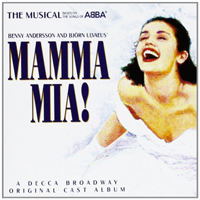
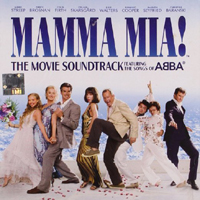
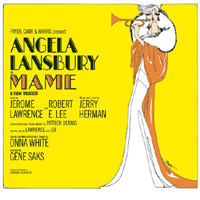
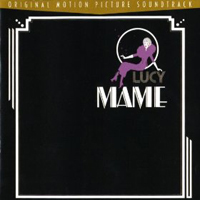
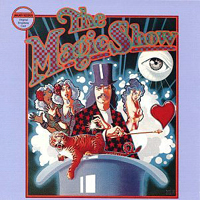
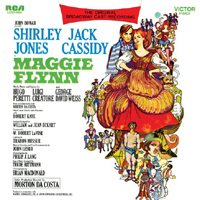

 (4 / 5) This is a musically adventurous, complex, and unruly Colombian stew by Heitor Villa-Lobos. The show was a flop on Broadway in 1948, but an admired one that was brought back decades later in a Lincoln Center concert version. The melodies, harmonies, and intricate rhythms of Magdalena sound like no other Broadway score, and the composer’s use of contrapuntal rhythms and strains — a player piano in the middle of a priest’s reverie, a pagan uprising during a state ceremony — is as sophisticated as in any opera. His orchestrations are dazzling, too, combining South American folk motifs with the sounds of late’40s Broadway. Unfortunately, the story that librettist Homer Curran and lyricists Robert Wright and George Forrest concocted is incomprehensible and annoyingly pious; the dull, religious heroine triumphs, but the fun-loving heathens have the best material. Some of the ballads and recitatives are faux-naif and bogus, but if you can endure those failings, you’ll be rewarded with a lavish, well-sung musical presentation based on the Lincoln Center concert. The witty “Food for Thought” lyrics, trilled to perfection by villainess Judy Kaye, and her later “Piece de Resistance”stand out. There’s also fine work from George Rose in one of his last roles, hamming it up lustily as a corrupt general. The romantic leads, Faith Esham and Kevin Gray, seem a little pallid by comparison, but they’re unfairly weighted down by all that shallow dialogue. Evans Haile conducts an enormous orchestra and chorus masterfully, and the flow of imaginative Villa-Lobos music is unending. A special nod to percussionist Patrick Smith, who is probably recuperating still. — Marc Miller
(4 / 5) This is a musically adventurous, complex, and unruly Colombian stew by Heitor Villa-Lobos. The show was a flop on Broadway in 1948, but an admired one that was brought back decades later in a Lincoln Center concert version. The melodies, harmonies, and intricate rhythms of Magdalena sound like no other Broadway score, and the composer’s use of contrapuntal rhythms and strains — a player piano in the middle of a priest’s reverie, a pagan uprising during a state ceremony — is as sophisticated as in any opera. His orchestrations are dazzling, too, combining South American folk motifs with the sounds of late’40s Broadway. Unfortunately, the story that librettist Homer Curran and lyricists Robert Wright and George Forrest concocted is incomprehensible and annoyingly pious; the dull, religious heroine triumphs, but the fun-loving heathens have the best material. Some of the ballads and recitatives are faux-naif and bogus, but if you can endure those failings, you’ll be rewarded with a lavish, well-sung musical presentation based on the Lincoln Center concert. The witty “Food for Thought” lyrics, trilled to perfection by villainess Judy Kaye, and her later “Piece de Resistance”stand out. There’s also fine work from George Rose in one of his last roles, hamming it up lustily as a corrupt general. The romantic leads, Faith Esham and Kevin Gray, seem a little pallid by comparison, but they’re unfairly weighted down by all that shallow dialogue. Evans Haile conducts an enormous orchestra and chorus masterfully, and the flow of imaginative Villa-Lobos music is unending. A special nod to percussionist Patrick Smith, who is probably recuperating still. — Marc Miller